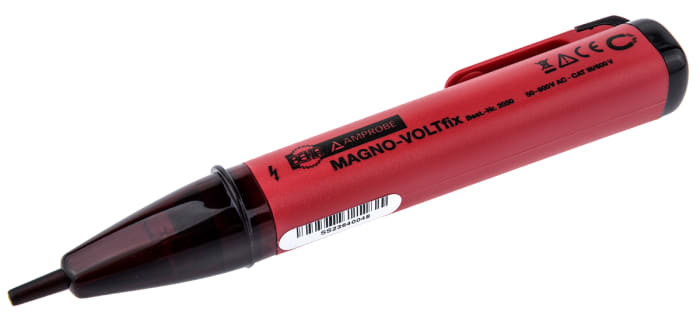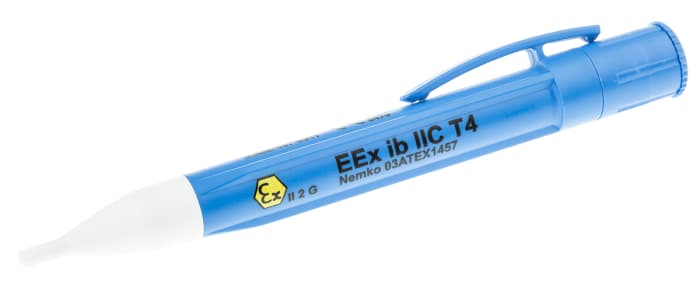RS PRO ATEX Magnetic Field Detector 0.3mT

Technical Document
Specifications
Brand
RS ProIndicator Type
Magnetic Field
Magnetic Sensitivity
0.3mT
Battery Type
AAA
ATEX Approval
Yes
Power Source
Battery
Weight
40g
Maximum Operating Temperature
+40°C
Minimum Operating Temperature
-20°C
Model Number p
ATEX
Model Number (p)
ATEX
Country of Origin
Denmark
Product details
RS PRO ATEX Magnet Stick
A non-contact magnetic field detector and solenoid tester, which lights up when the tip is in the presence of a magnetic field. The magnet stick is able to detect a variety of magnetic fields, from alternating current and direct current to permanent strong magnets. The test lamp of your magnet stick lights up immediately and without metallic contact when a magnetic field is present (e.g. an activated coil in a solenoid valve). A small test magnet is also housed in the cap allowing users to test to ensure the article is working correctly for accurate detection. Ideal for testing solenoid valves in pneumatic systems, hydraulics and vehicles, relays with coils can also be tested.
Features and Benefits:
• Easy to use
• Powerful red light indicator
• Lightweight
• Ambient Temperature: -20°C to +40°C
• Weight: 40 gms
Warning: Do not open when an explosive atmosphere is present.
Applications:
• Checking the functionality of relays, contactors, solenoids and coils • Testing solenoid valves in pneumatic and hydraulic equipment
• Automotive relay fault finding
• Air conditioning servicing
• Fault finding
• Testing solenoid valves when servicing oil burners
What is a magnetic field detector?
A magnetic tester or detector such as the Magnet Stick, is an instrument that is able to detect magnetism, they are able to identify magnetic materials or fields.
What is a magnetic field?
It is a vector field and best describes the magnetic influence of electric charge in magnetic materials or relative motion. Measured usually by strength and direction, these vector quantities can be measured in Gauss or units of Tesla in SI units. They are otherwise known as a moving electrical charge often used in electromechanics and engineering within electric motors.
Warning
Do not open when an explosive atmosphere is present
Stock information temporarily unavailable.
Please check again later.
€ 88.25
€ 88.25 Each (ex VAT)
€ 105.02
€ 105.02 Each (inc. VAT)
1
€ 88.25
€ 88.25 Each (ex VAT)
€ 105.02
€ 105.02 Each (inc. VAT)
1
Technical Document
Specifications
Brand
RS ProIndicator Type
Magnetic Field
Magnetic Sensitivity
0.3mT
Battery Type
AAA
ATEX Approval
Yes
Power Source
Battery
Weight
40g
Maximum Operating Temperature
+40°C
Minimum Operating Temperature
-20°C
Model Number p
ATEX
Model Number (p)
ATEX
Country of Origin
Denmark
Product details
RS PRO ATEX Magnet Stick
A non-contact magnetic field detector and solenoid tester, which lights up when the tip is in the presence of a magnetic field. The magnet stick is able to detect a variety of magnetic fields, from alternating current and direct current to permanent strong magnets. The test lamp of your magnet stick lights up immediately and without metallic contact when a magnetic field is present (e.g. an activated coil in a solenoid valve). A small test magnet is also housed in the cap allowing users to test to ensure the article is working correctly for accurate detection. Ideal for testing solenoid valves in pneumatic systems, hydraulics and vehicles, relays with coils can also be tested.
Features and Benefits:
• Easy to use
• Powerful red light indicator
• Lightweight
• Ambient Temperature: -20°C to +40°C
• Weight: 40 gms
Warning: Do not open when an explosive atmosphere is present.
Applications:
• Checking the functionality of relays, contactors, solenoids and coils • Testing solenoid valves in pneumatic and hydraulic equipment
• Automotive relay fault finding
• Air conditioning servicing
• Fault finding
• Testing solenoid valves when servicing oil burners
What is a magnetic field detector?
A magnetic tester or detector such as the Magnet Stick, is an instrument that is able to detect magnetism, they are able to identify magnetic materials or fields.
What is a magnetic field?
It is a vector field and best describes the magnetic influence of electric charge in magnetic materials or relative motion. Measured usually by strength and direction, these vector quantities can be measured in Gauss or units of Tesla in SI units. They are otherwise known as a moving electrical charge often used in electromechanics and engineering within electric motors.
Warning
Do not open when an explosive atmosphere is present



